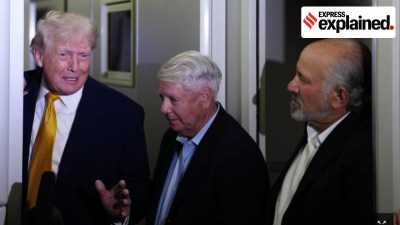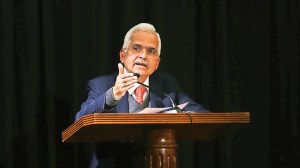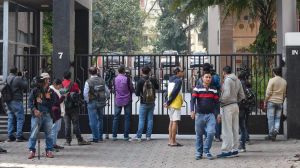Hardliners strike back, say jihad to continue
KARACHI, JULY 31: At first glance, Hafiz Muhammad Saeed, head of the Laskhar-e-Toiba, looks like a kindly Muslim cleric: in his 50s, bespe...

KARACHI, JULY 31: At first glance, Hafiz Muhammad Saeed, head of the Laskhar-e-Toiba, looks like a kindly Muslim cleric: in his 50s, bespectacled, with a flowing beard dyed brown with henna and a walking stick in hand. He speaks in a low voice, stressing the Arabic words as most Muslim clerics do.
But the message he preaches is far from conciliatory. On Monday, he told The Indian Express the Indian government should prepare for many such 8220;presents8221; like the one given by two Lashkar warriors on Sunday night, which killed six armymen and wounded seven in Kashmir. He said it was 8220;the beginning of the end for India8221;. Heavily armed had militants fired rockets and grenades at an Army camp in the north of Kashmir on Sunday night.
8220;By the grace of Allah, the two men who carried out the attack 8212; Abu Zar andAbu Ikrama not their real names 8212; are well and they communicated withme a short while back,8221; he said as his guards surrounded us at the Karachi Press Club, where he has just addressed a Press conference.
Earlier, as he arrived at the Karachi Press Club, the police outside arrived in heavy numbers while his own guards surrounded him carrying Kalashnikov rifles draped in black cloth to adhere to a nationwide ban on public displayof weapons.
Hafiz Saeed told the assembled journalists that compromise with India was out of question. 8220;There is no compromise in jihad,8221; he said, quoting a verse out of Koran to prove his point.
The Lashkar said the jihad in Kashmir would be intensified. 8220;We are talking to the Hizb-ul Mujahideen to show them the folly of their ways. I can tell you that there is some rethinking in their camp as India is now talking of doing everything within its Constitution. This is the first in a series of lies that India will give the Hizb.8221;
The Lashkar leader was also not happy with the stance of the Pakistan government. 8220;It is contradictory. General Musharraf says something and his ministers say something else. This is distressing,8221; he said.
But he said he would not be dragged into speculation over who was behind thecease-fire and what compulsions Pakistan faced. He did admit, however, thatthere was pressure on his organisation from the Pakistan government. 8220;Yesthere is pressure. But their job is to provide the guidelines. They cannot dictate each and everything to us. We know what is best for us,8221; he said.
In a related development, commenting on some news reports, Hizb-ul- Mujahideen spokesman Saleem Hashmi said in Islamabad today that 8220;there is no truth that we have nominated a team for talks8221;. Hizbul chief Syed Salahuddin had said in Islamabad: 8220;We will nominate Kashmiri representatives belonging to the All Parties Hurriyat Conference an umbrella group in Indian-controlled Kashmir or independent Kashmiris for negotiations. We will only monitor talks.8221;
The Islamic militant group, which has announced a cease-fire with India in Kashmir last week, has asked New Delhi to allow a meeting of Kashmiri leaders living on both sides of the disputed Himalayan region as a first step towards meaningful talks.
Meanwhile, the chief of Jamaat-e-Islami, Qazi Hussain Ahmad, alleged today that the cease-fire announcement by Hizbul had the backing of Pakistan.Addressing a Press conference in Islamabad, Hussain said 8220;Pakistan8217;s reaction showed it was involved in the announcement. It also indicated that Islamabad was aware of this development.8221;
However, Pakistan information minister Javed Jabbar dismissed Qazi Hussain Ahmed8217;s claim saying 8220;Pakistan has no role behind the Hizbul Mujahideen8217;s offer for cease-fire. Neither is it our bomb nor is it our shell. The Government of Pakistan has no role in it,8221; he told reporters here.
Rejecting the cease-fire, Hussain said the Hizb commanders had not informed the Jamaat before they announced the unilateral cease-fire . He said the Kashmir political leadership as well as the All Parties Hurriyat Conference were not happy over the Hizb8217;s decision.
Hussain Ahmed said a dialogue with India could be considered only if India admitted Kashmir to be a disputed territory.
- 01
- 02
- 03
- 04
- 05































